VIEWS ETHICS





President | Ritchie Bryant, MS, CDI, CLIP-R
Vice President | Dr. Jesús Rēmigiō, PsyD, MBA, CDI
Secretary | Jason Hurdich, M.Ed, CDI
Treasurer | Kate O’Regan, MA, NIC
Member-at-Large | Traci Ison, NIC, NAD IV
Deaf Member-at-Large | Glenna Cooper, PDIC
Region I Representative | Christina Stevens, NIC
Region II Representative | M. Antwan Campbell, MPA, Ed:K-12
Region III Representative | Shawn Vriezen, CDI, QMHI
Region IV Representative | Justin “Bucky” Buckhold, CDI
Region V Representative | Jeremy Quiroga, CDI
Chief Executive Officer | Star Grieser, MS, CDI, ICE-CCP
Chief Operating Officer | Elijah Sow
Operations Project Coordinator | Kirsten Swanson
Human Resources Manager | Cassie Robles Sol
CMP Manager | Ashley Holladay
EPS Manager | Tressela Bateson
EPS Specialist | Martha Wolcott
Certification Manager | Catie Purrazzella
Certification Specialist | Jess Kaady
Director of Member Services | Ryan Butts
Member Services Manager | Kayla Marshall
Member Services Specialist | Vicky Whitty
Affiliate Chapter Liaison | Dr. Carolyn Ball, CI and CT, NIC
Director of Government Affairs | Neal Tucker
Director of Communications | JJ Johnson
Web and Production Manager | Jenelle Bloom
Director of Finance and Accounting | Jennifer Apple
Finance and Accounting Manager | Kristyne Reeds
Staff Accountant | Bradley Johnson



erving equally our members, the profession, and the public by promoting and advocating for qualified and effective interpreters in all spaces where intersectional diverse Deaf lives are impacted.
As stated in RID’s purpose statement above, the Board of Directors has developed a strategic vision to promote and advocate for qualified and effective interpreters in all spaces where intersectional diverse Deaf lives are impacted. However, accountability for the impact should not solely fall on intersectional, diverse Deaf lives but should be shared among various entities in the interpreting profession. This shared accountability includes interpreting referral agencies, interpreting departments, interpreting preparation programs, and the video relay services industry.
Now, ethics is a collaboration of agreed upon standards among professionals, partners, stakeholders and consumers, and professional safeguards placed on the interpreting profession with one utmost goal: protecting the Deaf, DeafBlind, DeafDisabled, and Hard of Hearing Communities from harm.
Interpreting for these communities requires high trust, professionalism, and integrity, as they rely on interpreters to communicate effectively with the hearing world. Interpreters can access sensitive client information, including medical, financial, and personal information, so they have a responsibility to protect the privacy and confidentiality of their clients. Furthermore, interpreters play a critical role in bridging the communication gap between the Deaf, DeafBlind, DeafDisabled, Hard of Hearing, and hearing communities. The accuracy and credibility of the interpreter’s work can significantly impact the message’s delivery and understanding. Therefore, inter -
preters must uphold ethical standards that promote transparency, honesty, and fairness.
Accountability, trust, and integrity are essential principles in interpreting. Interpreters and the interpreting profession must share the responsibility for their work’s accuracy, protecting their clients’ confidentiality, and maintaining professional boundaries.

They must build trust with their clients, colleagues, and the Deaf community they serve, demonstrating competence, professionalism, and ethical behavior. Moreover, interpreters must act honestly, fairly, and transparently, avoid conflicts of interest, and disclose any potential biases that may affect their work.
Upholding ethical standards is ultimately a moral obligation that all entities in the interpreting profession share. By prioritizing accountability, trust, and integrity, we can ensure that our profession promotes communication access and protects the privacy and dignity of our clients. Let us continue to work towards promoting ethical behavior in all stages of interpreting practices, commit to ongoing professional development, and provide the highest quality work possible, to the communities we serve.
RID is the national certifying body of sign language interpreters and is a professional organization that fosters the growth of the profession and the professional growth of interpreting.
We envision qualified interpreters as partners in universal communication access and forward-thinking, effective communication solutions while honoring intersectional diverse spaces.
The values statement encompasses what values are at the “heart” or center of our work.
RID values:
• the intersectionality and diversity of the communities we serve.
• Diversity, Equity, Inclusion, Accessibility and Belonging (DEIAB).
• the professional contribution of volunteer leadership.
• the adaptability, advancement and relevance of the interpreting profession.
• ethical practices in the field of sign language interpreting, and embraces the principle of “do no harm.”
• advocacy for the right to accessible, effective communication.

ACCOUNTABILITY, TRUST, AND INTEGRITY ARE ESSENTIAL PRINCIPLES IN INTERPRETING.


I am personally very proud of RID’s recently released Ethical Practices System reform. This reform is huge. This change is amazing. I cannot thank our RID employees, the Ethics committee, and the EPS Reform workgroup enough who committed to seeing this task to completion. RID is laying the foundation for that culture of integrity and accountability with this reform as we are simply no longer willing to have valid grievances of incivility or unethical/unprofessional, or worse, illegal behaviors of our members and certification applicants to a) go by without being put on notice/addressed, or b) in egregious cases, allow RID’s name to be attached to their professional credentials.
In the past few weeks, we received many emails from members commending this reform, including some from international organizations seeking guidance from us on grievance systems. This supports the concept that increased accountability of our members and protection of the consumers we interpreters serve will have reverberating effects on the profession and potentially the international community. We’re pushing RID toward rebuilding trust with the communities whom we serve. The organization to the public on a macro-level, but also on an individual level between interpreters and consumers.
The EPS is about addressing real harm caused by bad and unethical actors in our profession against each other and against the consumers we serve. It’s also about protecting the integrity of the certification itself (e.g., against those who cheat to get or keep their certification), protecting the profession (e.g., from horizontal violence), and protecting people. The policy requiring self-disclosure of criminal convictions is put in place to protect members of vulnerable groups, especially Deaf children, Deaf people with intellectual disabilities, Deaf people who are senior citizens, and really all consumers.
Some people have expressed concerns about the scope that the EPS now covers, where previously the EPS applied to adherence to ethical and professional behaviors the CPC “while interpreting,” the new EPS refers to “outside of the interpreter-related setting,” but also to professional-related activities where one may be participating but not actually be performing
 RID CEO STAR GRIESER, MA, CDI, ICE-CCP
RID CEO STAR GRIESER, MA, CDI, ICE-CCP
the act of interpreting, e.g., at a conference. Other concerns are about what would be an example of behaviors that would rise to the level of an EPS complaint? Minor offenses? Social media rants? Personality conflicts between colleagues? People ask: “Where is the line between okay behavior and not-okay behavior? What does it hurt, anyway?”
To be clear, the EPS department doesn’t share any information about any cases with me beyond the bare minimum of statistics - intake vs. resolutions - and on an absolutely need-to-know basis. I can, however, share a few stories of what I’ve seen and become aware of as RID’s CEO, just in the past year and a half.

Last summer, I attended an ASL-interpreting conference with President Bryant and another Board member. Some workshops were being live-streamed on RID’s online Continuing Education Center to remote attendees. During that conference, we became aware that some virtual attendees were logged into two or more workshops on two or more different devices simultaneously for the purpose of earning CEUs with -
RID’s Civility Policy (yes, we have one), knowing that the EPS had no real teeth to address those behaviors directly at the time. If these people are bold enough to do these sorts of things to/in full view of their professional organization’s CEO or president, I can only imagine what these same people are doing in front of and to consumers or colleagues. And again, who suffers the most from these kinds of actions? The Deaf person in a counseling session, the Deaf person in the unemployment line, that’s who.
Every time we become aware of an interpreter misrepresenting themselves as certified when their certification was revoked, or when a person tries to hoodwink consumers by calling themselves “precertified” (that’s not a thing) or “RID Knowledge-Exam Certified” (that’s also not a thing), we take steps to protect the integrity of our certification, of course, but in light of interpreter regulation being lax in large parts of this country, ask yourself, who ultimately suffers the most from this deception? The Deaf patient in the ER, the Deaf TV viewer in a disaster area relying on that emergency information, that’s who.
out actually engaging with the content. They were brazenly cheating on their professional development requirements for continued certification. The previous EPS policy had no purview over that kind of activity, so the Board implemented a policy explicitly addressing cheating on earning CEUS at that and future events. That happened just last year, but I can’t help but wonder how often that has happened previously. This kind of thing also begs the question: who suffers when the ASL interpreter does not deepen or further their knowledge, skills, and abilities in their craft? The Deaf child in the classroom, the Deaf person at a job interview, that’s who.
Another example: Board members, volunteer leaders, and RID staff occasionally receive abusive and threatening emails or correspondence from members which contain profanity and audist, racist, discriminatory, derogatory - and sometimes violent - language. I will personally respond to those senders myself, citing the Code of Professional Conduct and
Yet another example, also just last year, in a social media conversation on an interpreter-related page about interpreter-related credentials, one interpreter doxxed another interpreter on the above-mentioned
The EPS is about addressing real harm caused by bad and unethical actors in our profession against each other...
social media outlet and sent threats directly to that person’s private communications channels and also to their employer. The former EPS policies have had no oversight over this kind of behavior because of limitations in scope.
That is simply not okay. If ASL interpreters leave the field in droves because of bullying and horizontal violence from colleagues in the field, and who ultimately suffers the most? The Deaf person who has to postpone their annual heart screening, their colonoscopy, their mammogram because the doctors couldn’t find an interpreter, that’s who.
The examples I listed above are only what I’ve witnessed as RID’s CEO.
The new EPS policy was broadened to refer to any space where an interpreter is clearly there or interacting with colleagues and/or consumers as a professional interpreter and/or a member of RID, and with the purpose of capturing these areas where previously the EPS had no purview. We’ve heard some concerns about the policy requiring self-disclosure of criminal convictions, and, yes, we have included people who are Black and Brown and members of marginalized groups in conversations about this policy and about racism within the American judicial system and, yes, concerns are valid and our eyes are wide open, and these conversations are ongoing.
The new policy requires self-disclosure, emphasizes that disclosure does not automatically mean ineligibility from certification or sanctions, and then considers each report on an as-needed, case-by-case basis. The policy requiring self-disclosure of criminal convictions applies to specific crimes in relation to the work of interpreters who are in positions of trust and have access, advantage, privilege, or power over the vulnerable groups we work with, e.g., identity theft, fraud, crimes of sexual assault or abuse (moral turpitude). RID honestly does not care about - nor do we have time or resources for - the person who got caught with pot a decade ago or the DUI they might have on their record.
The policy requiring self-disclosure of criminal convictions is to protect consumers of interpreting services from real harm and is also being put into place to cut off any rationale/potential funding for inprison interpreter training programs (and, yes, those really do exist, and guess who suffers the most from them). And, absolutely, a lawyer guided us through this process. I wouldn’t have it any other way. I was hired to protect this organization, and I take precautions to do just that. We’re working with one of the foremost experts in the country who specializes in grievance systems for certification within trust-pro -
fessions on this and who is nothing short of brilliant. Again, ultimately, the EPS reform is about creating a culture of integrity and accountability within the ASL interpreting profession. If an interpreter knows that their colleague is harming a consumer, then says nothing, does nothing, and then uses the NAD-RID CPC as their excuse (“Well, all assignment-related information is confidential”), they are just as culpable and should be held accountable as such. We all should be holding ourselves and each other accountable for upholding standards of civility, ethics, and professionalism, and - if we’re not already - we should constantly be thinking about the impact our decisions and our work has on our profession, our colleagues and our consumers.
I get the questions about the boundaries and limits of the EPS, and I understand that there might be some nervousness without more clear descriptions of prohibited behaviors. I hope people read the policy. If not, they should. It doesn’t cover everything, and with time and conversation, more and more examples will emerge. As it is now, the new policy spells out a lot. The descriptors will (as they should) be reviewed and updated yearly. They include some awful behaviors that, unfortunately, are problematic within some circles in this field.
I hope this article helps clarify and allay concerns some people may have and keep in mind the reasons why these reforms are necessary. If you have any additional questions or thoughts, please share them! Please email EPScomments@RID.org for general responses, or email me directly, and I will respond when I can. I seriously value and appreciate these discussions and look forward to more.



Region Representatives are proud to represent members who are dynamic and forwardthinking in the interpreting field.
LIRID (Long Island) is looking forward to hosting workshops and in-person events in 2023-2024. They are currently redesigning their website so keep an eye out for updates and our new look ~Submitted by Alyssa LIRID President
GVRRID (Genevive Valley) has successfully elected a new Vice President, Deaf Member-at-Large, Memberat-Large and Student Representative to our board. We will be relying on a special election for our open Treasurer position as we received no nominations in our regular election period. Keven Poore, our current Deaf Member-at-Large, hosted a very well attended workshop recently and we are thankful for that and the next two workshops that he plans to present in that series. ~Submitted by Eliza President
CRID (Connecticut) is working on our membership numbers as well as starting to get events going again. We have reached out to our members via a survey to see how we can help them and what they need, that might be mentoring, workshops, or just recreational time together since we often work in isolation. We have also attended Deaf functions to begin to show our presence in addition to emailing our members of local events. We are beginning to think about the RID Conference in Baltimore. ~Submitted by Julie Vice President .
RI RID (Rhode Island) , this past year getting back to a new normal has been taxing to everyone, including these volunteer positions. RI RID held one General meeting in 2022. RI RID has met quarterly as a Board, twice in person. Individual Board members have been able to join several Town Hall meetings from HQ. This information was shared with the Board and members via email and FB and Instagram, and our fabulous website: ririd.org
RI RID currently has no Treasurer, the remaining Board members are the same and members are stepping up to complete the requirements of the Treasurer position.
RI RID has sponsored two individuals pursuing their Deaf Interpreting career. They have enrolled in Road to Deaf Interpreting (RDI). They will report back to our membership how they have benefited from the course.

The Board is trying a new approach, restructuring the AC. The members will drive what this will look like. At our next General Membership meeting scheduled for Jun 24, 2023 10:00 am-12:00 pm. There the members will be asked to share how we can best support them and provide an opportunity for networking. The Board is thinking creatively to train behind and have newer members become an active part of the AC as
the next generation of Board members. RI RID wants to welcome and recognize members from Maine RID that have joined our AC.
~Submitted by Rosa and Maureen Co-Presidents
NJRID (New Jersey) , in November we hosted our 50th Anniversary Celebration where some of our seasoned interpreters shared a presentation on our history. It was our first in-person meeting/workshop since the pandemic and it was great to see so many colleagues together again. That excitement translated into refilling many of our committee chairs! Our Mentorship Committee is running again and we have two new Co-Chairs for our Professional Development Committee. We also have a “Newsletter” Committee that is responsible for sharing community events through social media.
NJRID visited the ITP in our area to introduce ourselves to the students and let them know they have a community that is excited to embrace their new ideas and be a resource for them after graduation. We have been hosting monthly virtual social hours to try to increase community networking and hopefully these can become hybrid social events so we have more face to face time. Moving forward, we will be hosting a workshop for our members “Essential Elements of Mentoring for Interpreters” by Anna Rose to encourage our more experienced members to join our new mentor list. We are also working on hosting another in person meeting/workshop in early June, date to be determined yet.
While we have had many people getting involved with committees, our board is in desperate need of member participation. Our Secretary and two Member at Large positions are currently vacant and our President, Vice President, and Treasurer positions are up for election in November and we have all served the maximum number of terms allowed by our bylaws. NJRID is hopeful that the growing momentum will inspire members to fill these positions soon.
~Submitted by Elizabeth Hasner NJRID President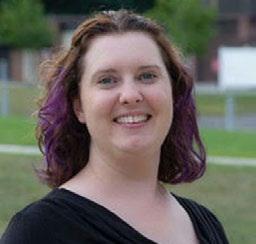
VTRID (Vermont) , Spring Greetings! We hope that everyone has weathered all the various snowstorms as safely & warmly as possible. With more sunshine in our days, we wish you much joy, fresh blooms, and maple syrup. It has been a pleasure working with all of you to serve VTRID and our greater Deaf Community. Thank you for your trust in us and the full Leadership Team. As always, please take gentle & good care of yourselves, and reach out anytime.
~Elizabeth, Lisa, Janet Tri-Presidents
2023 Elections
• VTRID is in the process of electing a new Leadership Team for the 2023-2025 term.
Bylaws
• https://vermontrid.org/our-bylaws/
• Many thanks to the myriad of VTRID members who helped craft the current bylaws in both ASL & written English!
Sliding Scale Membership Fees
• In 2022, VTRID implemented a pilot Sliding Scale Membership Fee. Results: 97% of our members opted to pay greater than or equal to $30 (our previous set fee amount)! We will be voting soon to see if this pilot becomes our new norm.
• View our current Membership Categories, Benefits & Sliding Scale here: https://vermontrid.org/membership/
Vermont State Agency of Education (AOE)
• On February 28th, VTRID submitted feedback to the AOE regarding the draft of their 2023 Application for DDBHH Educational Services Grant. Huge thanks to Kelly Decker for bringing this to our attention, and working diligently with the Leadership Team to craft our response.
NYC Metro RID , over the last year, we’ve been working with our new and continuing Board Members by deciding together and as a team on our respective responsibilities such as monthly newsletters, outreach, event planning, etc., as well as filling the remains vacancies on the Board. During the upcoming year, we expect to be focused on many activities similar to those. No updates for new legislation or website at this time.
~Submitted by Meagan Utsey Director at Large
Hello, I’m M. Antwan Campbell, your Region II Representative. Region 2 is busy and excited to be preparing for our conference season. We have several Affiliate Chapters (ACs) with new boards that are acclimating and / or re-establishing their chapters. As such, several Affiliate Chapters are preparing for their annual business meetings and getting ready for the RID conference in Baltimore!! A lot of ACs are revamping their websites or completely overhauling them for a new look and feel to their website. There is also a focus on increasing the number of trilingual, CDIs, and BIPOC interpreters within the region. Some are also going to interpreter training programs to promote student involvement to increase the pipeline for interpreters.
I look forward to seeing you all in July in Baltimore! Are you READY?

RID understands the necessity of multicultural awareness and sensitivity. Therefore, as an organization, we are committed to diversity both within the organization and within the profession of sign language interpreting.
Our commitment to diversity reflects and stems from our understanding of present and future needs of both our organization and the profession. We recognize that in order to provide the best service as the national certifying body among signed and spoken language interpreters, we must draw from the widest variety of society with regards to diversity in order to provide support, equality of treatment, and respect among interpreters within the RID organization.
Therefore, RID defines diversity as differences which are appreciated, sought, and shaped in the form of the following categories: gender identity or expression, racial identity, religious affiliation, sexual orientation, socioeconomic status, Deaf or hard of hearing status, disability status, age, geographic locale (rural vs. urban), sign language interpreting experience, certification status and level, and language bases (e.g., those who are native to or have acquired ASL and English, those who utilize a signed system, among those using spoken or signed languages) within both the profession of sign language interpreting and the RID organization.
To that end, we strive for diversity in every area of RID and its Headquarters. We know that the differences that exist among people represent a 21st century population and provide for innumerable resources within the sign language interpreting field.


AMBER ROBINSON, B.S., NIC
JASON HURDICH, M.ED, CDI, RID SECRETARY
PART 4 OF 4
Amber Robinson: We as interpreters have to mask all the time - we always want white interpreters to remember how we are doing, to check in on us. Remember when we are contacted, sometimes it is good to get a check-in, such as “hey, just wanted to know how you are doing,” rather than we need you to interpret this, we need you for an event. After that kind of consideration, then okay, yes we want to partner after something like that. Because now we see who you are. Yes professional, but it’s after the fact, but after that, you don’t know.
Jason Hurdich: Deaf interpreters see that on a regular basis.
AR: How can we partner? Those people still need to be educated before we can partner up. Same for younger interpreters. The interpreters can provide vocabulary that older interpreters can’t. Because they may call it slang.

JH: Technology has really taken off.
AR: Yes, exactly. You see older interprets struggling. But the only ask for younger interpreters is for volunteer hours, or school hours or work hours. Why not bring us on, recruit us to work at deaf events. Invite us to come to the workshop, invite us along, come join us for a luncheon, or a dinner. That’s not happening. So how can we partner when we can’t trust people?
JH: So how would you suggest that to develop trust?
AR: Develop the trust by first trying. It starts really with the ITPs. ITPs are more and more - ITPs students are looking for mentors. Those mentors are involved with organizations. So it’s the same way to recruit, invite us to come along, participate in a dinner, invite, rapport - build that rapport, you know.
JH: Develop a relationship.
AR: Keep going to more events with various organizations. Then expand your pool to those who are younger; they may feel they have friends that may not know of other organizations, and they’ll partner and collaborate and network. You have to try first, it’s that simple.
JH: Plus keep in mind that attitude is important too. Keep in mind how my privilege affects us. I mean in talking about privilege, talk about unpacking things, I just went to NAD in Orlando, Florida, in which we were using a new sign for unpacking, but it’s not that right concept - there is not a lot of content with that sign, looking at how language evolved and how “unpacking from a box” changed to “sharing from the heart,” it looks confessional. It is interesting to me how in 2022 we are still struggling to define a sign that matches unpacking, as an example. So there’s a lot of gaps and at the same time there is progress. It is interesting to see that during your presentation, you know what I mean. I know there’s been a few Black deaf that have phds, but not many. Of course you’ve talked about systemic barriers like racism, audism, sexim, that’s something that but you have a young interpreter that is experiencing another barrier too, as compared to someone that may be more experienced. But Codas have those barriers too.
AR: That’s right Codas experience those barriers. Codas get the attitude of ‘here’s another one.”
JH: I don’t understand that as a background reaction.
AR: Same deaf Black female interpreters will experience even more barriers, you know that I mean.
JH: Right, you see that. Okay one last question. I know that this was a great experience. I hope you will come to RID’s National Conference in Baltimore next
year.
AR: Yes please, I will yes!
JH: Ok great, we will work it out! Last question: your truth - what is your truth as a Black coda female interpreter how has that impacted your journey. What do we need to consider (obviously this will be in an article) what do we need to think about? I know you mentioned partnerships. What last thoughts do you have that you want to emphasize? That’s a tough question for myself too, like how the idea of inclusion, partnership, which you mentioned. Now we still care about safe spaces. Those are important as well. In your journey this far as you have grown up in Talledgeda, Troy, and now Birmingham, you’ve experienced different phases in your journey. If you, now in 2022 could share something with your younger self, Amber in 2012, what would you tell her? What would help her, ten years ago?
AR: You will become more than they expect. That means that you will be more than they expect, which means you will exceed and grow past those expectations. Why - during your life you’ve had struggles, personal, professional, whatever. It could be confidence struggles but move forward and you’ll understand at the end. You will be successful, you will become Black excellence. Period.
JH: Thank you, I love how you ended with that phrasing. Suppose there are any BIPOC students, knowing that in ITPs they are feeling they’re out of place, and feeling not included and feeling alone, as the only one, ie:feeling “what would be the point.” At the same time we need more of those of you to be in our profession. What words of wisdom would you share to younger interpreters watching you today in 2022?
AR: As I shared during my presentation, I realized three words that hit me and will resonate with Black interpreters in the room. And still impact today. You are enough. That’s it. A lot of the time Black interpreters think they’re not doing enough but they are.
JH: I want to thank you for your time sharing your experience, and your story of your journey. It is impressive. Would you mind continuing in this perspective: I know your dad passed away in 2020.
AR: Yes, December 2020.
JH: Share what he might think of your journey, your dad’s or mom - your parents, either way - what they might think of seeing you doing this work now? If you could sit with your dad?
AR: My mother would say, “I knew it.”
JH: Meaning they knew you’d be a success.
AR: They already knew, they already set me up from birth to be a success, they already knew my plan. What they wanted was not what I would do. They knew I would be a success and they were both very proud and happy that I took that opportunity that they gave me and I thrived. And I’m still thriving
JH: And you will continue to thrive. I hope you will become a teacher at an ITP! Will you do that? You should become a teacher at an ITP.
AR: I will be supportive. I will be a supporter. I will be the village, it takes a village to help raise a child!
JH : Maybe you can do that at an HBCU, maybe set that up there?
AR: I don’t know. Maybe that’s something to consider, put that at the back of my mind. I want that so badlyto see an HBCU establish an ITP.
JH: The board has been discussing the idea of working with an HBCU, there is a lack of interpreter training programs there. We could easily write a federal grant to get the money to form an ITP. It would take time, it would not be magical, it would take time to build but it can be something powerful i think right? There are many wonderful HBCU’s all over the country. I imagine we could set up an ITP in one of these programs.
AR: I can’t wait. Maybe we will see!
JH: Thank you for sharing your experience and your journey as a Coda, as a Black woman and your many identities with a Deaf family, and as an interpreter. I live in the South too, I identify as a southern person as well, I know the Black experience in the North is different than that in the south. I hope you will continue to share your experience, not only during the month of February but year round. Not just you, but your community can be a powerful force in sharing your experiences and those from marginalized communities to work with you more frequently, but look for opportunities for continued learning. Thank you for your time. Thank you for your time. I’m sure there will be others that will want to learn from your journey.
AR: I hope so too!
JH: Yes they will, I can guarantee that! Maybe I will see you in Baltimore!

July 26-30, 2023
Baltimore, Maryland
• Exclusive advertising during and post conference
• Logo on RID website and Facebook
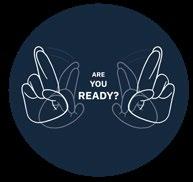


• Complimentary conference registration and exhibitor booth(s)
• Podium recognition
• Closing night event tickets, and more!
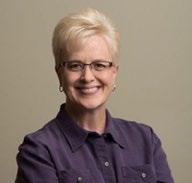 BY: ELIZABETH FOX, JANET DICKSON & LISA BIXLER, TRI-PRESIDENTS OF VTRID WITH CAROLYN BALL, PHD, CI AND CT, NIC, RID AFFILIATE CHAPTER LIAISON
BY: ELIZABETH FOX, JANET DICKSON & LISA BIXLER, TRI-PRESIDENTS OF VTRID WITH CAROLYN BALL, PHD, CI AND CT, NIC, RID AFFILIATE CHAPTER LIAISON
Our goal is to provide all substantive communication in both English and ASL. It’s part of the fabric of who we are, what we believe in, and what we do. We believe this practice provides access to all members and fosters a more inclusive opportunity to engage.
At the start of 2022, VTRID worked on updating the English version of our Bylaws. The idea for creating them in ASL video format was first broached during the initial phases of drafting. Following the adoption of the updates/amendments, during a VTRID quarterly business meeting the ASL project was on the agenda and we got member’s support for the project. Elizabeth Fox, our lead for the project, then sent out a signup sheet asking individuals to choose which section of our bylaws they wanted to render into ASL.
One of our biggest challenges was getting already busy members to take on an additional commitment such as this. Another challenge was that some of our members were willing but felt they lacked the technical skills needed. Elizabeth managed these concerns by giving members flexibility in deadlines and by offering tech support to anyone that needed it. Over a period of 6-8 weeks members made their recordings and sent them to Elizabeth to compile.
We believe this practice provides access to all members and fosters a more inclusive opportunity to engage.
Elizabeth took the lead on all aspects of this project. This project is just one example of why having a TriPresident model has really worked for VTRID. Elizabeth is definitely the one with the strongest tech skills so she was not only able to organize it, but also extended technical help/support to anyone that needed it. As a team we try to capitalize on each of our strengths as we take on various tasks.
Great! It was wonderful to have so many members partake in the endeavor. Many hands make light work, as they say. Having a variety of our members create the videos in-house really. Plus, now anyone stopping by our website can actually see who some of our members are!

We can do hard things. *Huge smile*
Satisfaction and pride that we had done this project as AC members. Also, we are so proud of our Affiliate Chapter Members. Thank you VTRID!
WITH OVER 13,000 MEMBERS IN THE US AND ABROAD, RID IS THE LARGEST, COMPREHENSIVE REGISTRY OF AMERICAN SIGN LANGUAGE (ASL) INTERPRETERS IN THE COUNTRY! EASILY REACH OUR MEMBERS THROUGH THIS VERY PLATFORM, VIEWS, FOR YOUR COMPANY OR ORGANIZATION’S EVENTS, PROMOTIONS, JOB ANNOUNCEMENTS, WEBINARS AND MORE. INTERACTIVE OPPORTUNITIES ARE AVAILABLE TO ENGAGE YOUR POTENTIAL CUSTOMERS AND CLIENTS IN A WAY THAT IS UNMATCHED.


ADVERTISE TO EXPAND YOUR REACH IN THE COMMUNITY!
RID recently announced new rules in how the Ethical Practices System will handle reported violations of the NAD-RID Code of Professional Conduct.
These changes are the most substantive introduced in my 24 years of membership in the association and swing the balance of power away from the interpreter and towards the Deaf community. With such a large transfer of power, members need to understand and think carefully about where we have been, where we are, and where we are going.

A ccording to Lou Fant’s seminal Silver Threads 1 , the notion of an ethical code was on the mind of our association’s founders in 1964. It was during that celebrated June meeting at Ball State University in Indiana where our present code got its start. In the official minutes of that meeting, right after deciding the purpose of RID (to increase the number and quality of interpreters), it was decided:
“A code of ethics is to be developed by the organization.”
It wasn’t until the second meeting of RID (then called the NRPITD) in 1965 that the board assigned a committee to work out what the new code would be. The chair, and sole member, was Dr. Lottie Riekehof.
The code of ethics evolved further over the years and eventually got rid of tenets such as requiring “emotional maturity” and being “willing to provide services in situations where funds are not available.” 2
Eventually, RID partnered with its long-time partner, the National Association of the Deaf, to set forth the current iteration, the NAD-RID Code of Professional 1 Fant, L. (1990). Silver Threads. RID Press. See pages 3, 13-14. 2 Ibid., pp. 135-136.
The judicial mechanism for holding interpreters accountable to the CPC in its current form was established in 2006 (T. Bateson, personal communications, April 8, 2023). The system, which persisted until 2023, was designed to encourage arbitration and resolution of conflicts, not necessarily to offer discipline or punishment for gross violations.
On April 19, 2023, RID announced a new EPS handbook that included many fundamental changes to the system, including:
• Anyone can file a grievance. In the old system, only a person directly impacted by the behavior could file. This usually meant only the Deaf consumer could grieve. With the significant imbalance of power that exists between the two parties, this inadvertently meant that harmful behavior often went without consequence.
• Behavior off the clock counts. If an interpreter scammed the local association of the Deaf out of money, previously, this wouldn’t count as a grievable offense as it was outside of

an interpreting event. Now, all actions related to the profession are fair game.

• Criminal convictions will be reviewed. Presently unless someone was convicted for doing something while interpreting, criminal activity bore no impact on certification status. Now, RID has a review process to determine if the actions impact the ability of the interpreter to be trusted.
• Members must report violations. Members are now required to report unethical behavior by other members or risk sanction themselves. This may be the biggest shift for the profession, and one that will require a lot of testing and monitoring to see how it applies in practice given the somewhat subjective notion of ethical behavior.
• Discrimination is a violation. RID is taking a stand against behaviors that are racist, sexist, homophobic, transphobic, audist, and ableist. It’s worth noting that an interpreter can still turn down assignments based on lack of fit, meaning, no one will be grieved against for not accepting an assignment incompatible to their personal beliefs.
• Time limits are abolished. Complaints previously had to be filed very quickly, within 90 days of the offense occurring. The new handbook does not indicate a time limit meaning individuals can have time to process offending events and decide whether or not to grieve before the clock runs out on them.
Perhaps most fundamentally, the system changes from a mediation and arbitration framework to one that is more judicial in nature. Instead of bringing disputing parties to the table to work things out, the EPS will now act to hold individuals accountable for their actions.

The data published by RID on their EPS website leads to some startling conclusions. Only 23 individuals are reported as having been sanctioned in the last 18 years. That’s .13 per 1,000 (based on ~10k certified members), compared to an average of 3.76 per 1,000 for doctors in the United States 3 , as an example. That means that your doctor is 28 times more likely to be sanctioned than your interpreter.
The comparison holds with another trust-based profession: Certified Financial Analysts (CFAs). American CFA® charter
This may be the biggest shift for the profession, and one that will reuqire a lot of testing and monitoring to see how it applies in practice...
“A body of men holding themselves accountable to nobody ought not to be trusted by anybody.” - Thomas Paine
holders (similar to RID’s certified members) suffered revocation of their charter at an average rate of 0.2 per 1,000 over the last five years 4 . Interpreters lost their certifications just three times since 2005, or a rate of 0.016 per 1,000 certified members. That means the CFA giving you investment advice is also 12 times more likely to face the most severe sanctions than an interpreter.
What’s also troubling is the lack of severity of consequence for an RID-sanctioned interpreter. Only 13% of the time (three times in the past 18 years) did an interpreter lose their certification permanently. 30% of the time they had their certification procedurally suspended for three-months, or until completion of a sanction such as writing an essay or taking an eight-hour workshop, whichever came later.

These mild sanctions were true regardless of how many of the tenets of the Code of Professional Conduct were violated. On average, interpreters violated 3.5 tenets per case. All but one case the interpreter was sanctioned for the broad ‘professional conduct’ tenet. A majority of cases also sanctioned interpreters for lack of respect for consumers (65%), lack of professional skill for the assignment (57%) and lack of ethical business practices (52%).
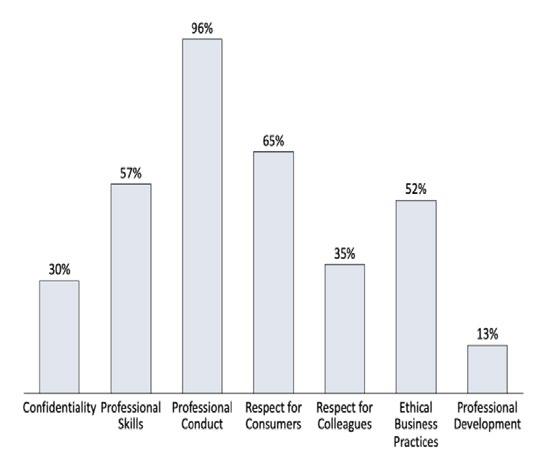
In one case, an interpreter was found guilty of violating six of the seven tenets but still did not receive a permanent revocation. The most common outcome amongst all cases was some combination of
4 Data taken from https://www.cfainstitute.org/en/ethics-standards/ conduct
required mentorship, training or reading, and writing a reflective essay.
This points to an inescapable conclusion that the system was broken. Requirements for speedy filing, restrictions on who could complain, and lack of meaningful relief all likely caused legitimate concerns to go unheard, further marginalizing our Deaf communities in the process. The recent reforms adopted by RID will hopefully start to build faith in the system, increase accountability within the profession, and better safeguard the consumers we serve.
Since speaking publicly about the EPS changes, I have heard from colleagues who have lamented that these changes don’t matter since, in many states, an interpreter can just resign their membership in RID and continue working. Others have pointed to the lack of meaningful action in the past as a reason to shrug off these changes. “Why bother?” is a common refrain.
It is true that RID does not (and should not) have sole authority over who can and cannot practice in the interpreting field. There are ways around RID’s authority in most places, especially since there are competing credentialing systems and entities who hire without any credentials anyway.
However, there are real impacts to official sanction ranging from social to monetary. Lack of certification, and revocation action, can restrict employment options and reduce pay with entities that have a graduated scale based on credentials. More importantly, the EPS system at its core is about professional accountability and the integrity of the certification system. We must hold ourselves accountable to each other and to our consumers; we must ensure that when someone boasts RID certification, that we as a community have at least ensured that the person is not actively harming people in their practice.
The system has long had an imbalance of power that strongly favored the interpreter and left the Deaf consumer with little meaningful recourse. Failure to address this imbalance, to essentially do nothing, is an action for which we will have to answer as well. As the 17th century playwright, Molière put it, “it is not only what we do, but also what we do not do, for which we are accountable.”
Congratulations and gratitude are due to the Ethics Committee, the RID Board, and the headquarters staff who all had the courage to take decisive action.


Abstract
This research paper addresses how interaction with the DeafBlind community can assist student and novice interpreters in their professional development. The literature review is a collection of articles and narratives that display the values within DeafBlind culture and community, Protactile language, co-navigating skills, and other attributing factors (later referenced as the DeafBlind ecosystem). This collection will be analyzed for patterns that may be beneficial for the targeted groups. These sources come from all branches of the DeafBlind community including teachers, academics, leaders, and students; and connected communities without a DeafBlind identity, such as students, hearing interpreters, and deaf interpreters. This research may assist interpreting students in how they approach accommodations and flexibility within their careers.
The Benefits of Exposure to the DeafBlind Ecosystem for Student & Novice Interpreters

Interpreting students entering the field of interpreting as novices are exposed to various types of stressors. They now must put the theory they may have been learning to practice on real people in real situations. Often this may be overwhelming for inexperienced interpreters as they secure themselves in the field. In Seattle, Washington there is the emergence of Protactile Language from the DeafBlind community. Interaction with this ecosystem may be beneficial to student and novice interpreters by exposing them to the values, experiences, narratives,
and barriers that this minority encounters. The literary review section of this research paper will pertain to the five themes involving the properties, analysis, experiences, interpreters, and education within the DeafBlind ecosystem. This collection of research and the conclusions reached may prove useful to the targeted interpreting group. It is worth noting that the Protactile Language Interpreting (PLI) website is the new name of the previous DeafBlind Interpreting (DBI) organization. Materials released when DBI was still active often are still marked as DBI while some materials are marked under the new organization name or PLI. However, all materials found under DBI can be found under PLI. DBI and PLI are synonymous with each other in terms of content.
My experience with the DeafBlind community and Protactile language is still new. I first involved myself with the DeafBlind community in March of 2022. I was first exposed to this community when I took a weekend workshop on DeafBlind co-navigating and then worked for DeafBlind Interpreting (DBI), now known as Protactile Language Interpreting (PLI), for a month as a student co-navigator. Since then I have involved myself with the community, which includes volunteering my time to co-navigate with visiting and local DeafBlind individuals. During the spring term of 2023, I enrolled in another DeafBlind co-navigating class to continue my education on the topic. These experiences do influence my analysis of varying literary texts and information relating to Deaf-
March 20, 2023
Blind culture, community, and Protactile language–along with having a personal understanding of the student and novice interpreting experience and the impact that working with this group of people has on one’s development.
The articles and sources reviewed fall into five categories: anthropological properties, analysis of DeafBlind experiences, accommodations and education of those who are not DeafBlind, education and training of DeafBlind people, and the role that interpreters play when involved in this minority. When discussing anthropological lenses, Edwards (2014, 2015, 2017) analyzes the linguistic and social features of Protactile Language (PT), Tactile American Sign Language (TASL), Visual American Sign Language (VASL/ASL) and the cultural and community essence within these language groups. Edwards (2014, 2015, 2017) also expands on PT as a separate language from ASL and TASL. Protactile may have linguistic roots in the two, but they are not the same language. Another source of language use, as well as the DeafBlind experience, is John Lee Clark’s written pieces. Within his website, one article is named Against Access (Clark, n.d.) he discusses the barriers he faces, the changes he has witnessed in himself as he has settled into his DeafBlind identity, and his interaction with ASL interpreters as new co-navigators. He says that “Giving quick reads without getting bogged down in details is an important skill… But ASL interpreters are at first inhibited by notions of neutrality
and objectivity” (Clark, n.d., para.11). His analysis and first-hand experience are key in understanding the values in place and their impact on student and novice interpreters.
Accommodations, like co-navigators, are important support tools. Wolsey (2017) opens this conversation up and collects information from various DeafBlind College interviewees whose accommodations all differ, some using Certified Deaf Interpreters (CDIs), some using VASL, some using note takers, and so on. Within accommodations comes the connection to DeafBlind education and training. This advocacy for education can start very early. Miles (1999) provides education on how guardians may interact with their DeafBlind children; including, familial and professional support in his presentation The Remarkable Conversation. The resource page on PLI’s website (n.d.) also provides information relating to the education and empowerment of DeafBlind individuals of all ages (and interpreters) in their training and YouTube videos.
Speaking of interpreters, they are another accommodation option and often require training– which is extremely important in this field. Protactile Language Interpreting works to train interpreters in PT and conavigating. In the article Discoursing into Interpreting the author provides dense information on the relationship found between interpreters and DeafBlind individuals:

This article will focus on interpreting students’ process of Bildung [loosely understood as linking oneself to the world and the ability to achieve understanding] expressed in their construction of professional identity as interpreters for DeafBlind people…aims to illustrate what discourses interpreting students draw upon when constructing their professional identity and how their professional identity is transformed by interpreting for DeafBlind individuals, as they draw upon and reshape concepts and discourses found in the educational context. (Urdel, 2019, p.1)
These sources contain foundational information needed to decipher the impact that the DeafBlind ecosystem has on student and novice interpreters.
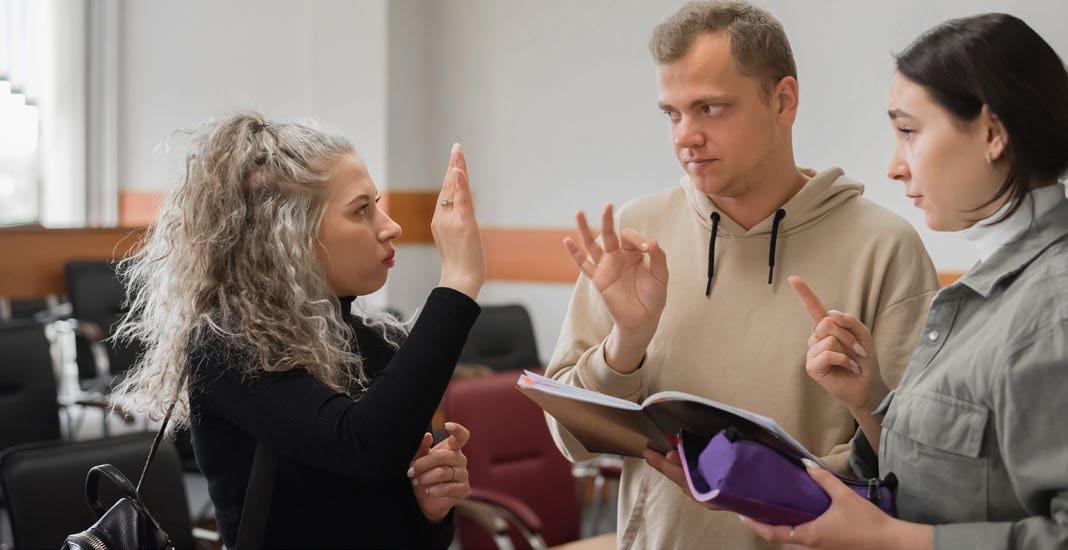
the DeafBlind ecosystem, as listed in the positionality statement of this document.
This collection of work highlights specific values that the DeafBlind community strives for. A prominent one is slowing down from the hearing and/or sighted standard, as access is far more important than speed. This is supported by many of the pieces on Clark’s website. PT is a touch-based language and culture. Touch is a modality that our world is not built for, this means that getting the scope of an environment may take longer. This encourages students to take time to understand the DeafBlind perspective.
Along with understanding the variability of what access means and how to accommodate it. Sometimes
The methodology of this research, which best replicates that of an integrative review, was primarily conducted by collecting and analyzing research articles and website postings. Using Western Oregon University’s (WOU) library database was influential in obtaining many of these articles. Key terms used in this search included a combination of DeafBlind, ASL, Protactile, TASL, co-navigating, interpreting, and autonomy. As well as looking at the references listed within other’s research articles. Along with discussions within WOU’s Interpreting Program, specifically, the 2022-2023 senior cohort, discourse and assignments within the Current Aspects of Interpreting (INT 460) class prompted information sharing. Supplementary resources from Protactile Language Interpretering’s website were also involved in building this review. Any additional methods for obtaining this research were from personal interaction with
this means thinking more flexibly about what neutrality and bias mean in different spaces. Edwards (2014, 2015, 2017) provides data on how this community functions against hearing and sighted norms, which is seldom something that student and novice interpreters are familiar with. In addition, PLI teaches these values to others but also broadcasts them on its website. Having tactile descriptions of their employees instead of focusing on pictures. Values within the DeafBlind ecosystem are endless but it is important to note a special few. The first is running on ‘DeafBlind’ time, which may be slower but is far more accessible and enjoyable. Next, CNs and PT interpreters are there to provide information but not make decisions. The golden rule is to never strip anyone of their autonomy. Another is being flexible in the unknown and being able to go with the flow. And last, the way a person shows respect is to touch, after all, tactile language creates connection through touch.
The values of the DeafBlind ecosystem are extremely impactful and the community is taking more action toward access and equity each day. Student and novice interpreters must learn that one size does not fit all and that concept is extremely prevalent in the variety found within the DeafBlind Community. It is also critical that they learn about other cultures as they in their careers will interact with a wide variety of people who all have different backgrounds. Backgrounds that may include additional disabilities, and that type of flexibility in skill and mind is monumental. Being able to tackle new challenges is prized amongst interpreters and the ability to slow down is crucial. Speed does not mean you are more skilled than the person that signs slower. The goal is for the message you produce to be effective for the target audience. Tactile communication, like PT, also helps build the ability to think ‘outside the box’ as the language is different from ASL. That kind of critical thinking will serve them well in their professional lives. There is also the demand for access– interpreters are there to provide access and you cannot do that if you are uneducated about what access may look like to a particular community. And the golden rule is still true when applying it to ASL, autonomy is number one! All of these values and traits are needed in this growing field and by its future professionals.
Diving into a widely new environment can be overwhelming and challenging– but taking a step back, with a different perspective, can also be extremely rewarding and nurturing to not only one’s skill but personal development. This statement aligns perfectly with my own experiences regarding my DeafBlind community involvement. It is not unheard of for student and novice interpreters, like myself, to feel anxious regarding their professional identity and skillset. Taking on that slow, steady, and calm demeanor– also known in CN classrooms as the Zen Turtle– can be a great investment in their careers. Involvement in this DeafBlind ecosystem is something that all student and novice interpreters should partake in. This exposure will only help evolve their talents.
Clark, J. L. (n.d.). Against Access. McSweeny’s 64The Audio Issue. Retrieved March 10, 2023, from https://audio.mcsweeneys.net/transcripts/against_access. html
Edwards, T. (2014). Language emergence in the Seattle DeafBlind community [Doctoral dissertation, UC Berkeley].
Edwards, T. (2015). Bridging the gap between DeafBlind minds: interactional and social foundations of intention attribution in the Seattle DeafBlind community. Frontiers in Psychology, 1497.
Edwards, T. (2017). Sign-creation in the Seattle DeafBlind community: A triumphant story about the regeneration of obviousness. Gesture, 16(2), 305-328.
Miles, B., & Riggio, M. (Eds.). (1999). Remarkable conversations: A guide to developing meaningful communication with children and young adults who are deafblind.eBookIt.com.
Protactile Language Interpreting. (n.d.). Resources. US Department of Education Rehabilitation Services Administration. Retrieved February 14, 2023, from https://protactilelanguage interpreting.org/ resources.html
Urdal, G. H. S. (2019). Discoursing into interpretingsign language interpreting students and their construction of professional identity as interpreters for Deafblind individuals. Journal of Interpretation, 27(1), 4.
Wolsey, J. L. A. (2017). Perspectives and experiences of DeafBlind college students. Qualitative Report, 22(8).

Associate/Certified: $675

Student/Supporting: $275
Retired/Inactive: $275
Non-Members: $845
Organizational Members can request registration group rates online.


Click HERE!
Wednesday Rate: $200
Thursday Rate: $150
Friday Rate: $200
Saturday Rate: $200
Sunday Rate: $150
Areas of Focus: Legal and medical settings, cognitive processes, mentorship and more!

Schedule: Click HERE !
Earn CEUs: Up to 2.975
Thursday Evening: Block Party
Thursday Night: Drag Bingo
Friday Night: ASL Performance
Saturday Night: Closing Night Event

• Can you register on-site?
• What’s included with your registration?
• What kind of accommodations are available?

• Why should you book your hotel through the RID website?
You can find the answers to your conference related questions HERE!


02 03 04 05 06 07 08 09
Valid generalist certifications no longer offered: IC, TC, CSC, MCSC, RSC, ETC, EIC, OIC, CI and/or CT, OTC, NIC Advanced, NIC Master appear before all others. IC and /TC appear first (e.g. IC/TC, CSC)
OIC certifications appear directly after all other old generalist certifications (e.g. TC, CSC, OIC:C)
Current generalist certifications (CDI, NIC) appear after generalist certifications that are no longer offered (e.g. IC, CI and CT, OTC, NIC)
NIC certification appears after the CI and/or CT
The OTC certification appears after the NIC certification
Specialist certifications (SC:L and SC:PA) appear after all generalist certifications
NAD certifications appear after all RID certifications

Ed:K-12 appears after NAD certification
CI and CT are always expressed together as “CI and CT” or “CI & CT”

Decision Date: April 6, 2023
Member Name: Pamela Soto
Violations
1. Confidentiality
2. Professionalism
4. Respect for Consumers
5. Respect for Colleagues
3. Conduct Sanctions: Certification Revoked

Below is a link to a page on the RID website, accessible to the community at large, that lists individuals whose certifications have been revoked due to noncompliance with the Certification Maintenance Program or by reasons stated in the RID PPM. The Certification Maintenance Program requirements are:
Maintain current RID membership by paying annual RID Certified Member dues.
Meet the CEU requirements:
• 8.0 Total CEUs with at least 6.0 in PS CEUs
• Up to 2.0 GS CEUs may be applied toward the requirement
• SC:L only–2.0 of the 6.0 PS CEUs must be in legal interpreting topics
• SC:PA only–2.0 of the 6.0 PS CEUs must be in performing arts topics
Adhere to the RID Code of Professional Conduct and EPS Policy.
If an individual appears on the list, it means that consumers working with this interpreter may no longer be protected by the Ethical Practices System should an issue arise. The published list is a “live” list, meaning that it will be updated if a certification is reinstated or revoked. To view the revocation list, please visit HERE
Should a member lose certification due to failure to comply with CEU requirements or failure to pay membership dues, that individual may submit a reinstatement request. The reinstatement form and policies are outlined HERE.
VIEWS, RID’s digital publication, is dedicated to the interpreting profession. As a part of RID’s strategic goals, we focus on providing interpreters with the educational tools they need to excel at their profession. VIEWS is about inspiring, or even instigating, thoughtful discussions among practitioners. With the establishment of the VIEWS Board of Editors, the featured content in this publication is peer-reviewed and standardized according to our bilingual review process. VIEWS is on the leading edge of bilingual publications for English and ASL. In this way, VIEWS helps to bridge the gap between interpreters and clients and facilitate equality of language. This publication represents a rich history of knowledge-sharing in an extremely diverse profession. As an organization, we value the experiences and expertise of interpreters from every cultural, linguistic, and educational background. VIEWS seeks to provide information to researchers and stakeholders about these specialty fields and groups in the interpreting profession. We aim to explore the interpreter’s role within this demanding social and political environment by promoting content with complex layers of experience and meaning.
While we publish updates on our website and social media platforms, unique information from the following areas can only be found in VIEWS:
• Both research- and peer-based articles/columns
• Interpreting skill-building and continuing education opportunities
• Local, national, and international interpreting news
• Reports on the Certification Program
• RID committee and Member Sections news
• New publications available from RID Press
• News and highlights from RID Headquarters
VIEWS publishes articles on matters of interest and concern to the membership. Submissions that are essentially interpersonal exchanges, editorials or statements of opinion are not appropriate as articles and may remain unpublished, run as a letter to the editor or as a position paper. Submissions that are simply the description of programs and services in the community with no discussion may also be redirected to a more archival platform on the website. Articles should be 1,800 words or fewer. Unsigned articles will not be published. Please contact the editor of VIEWS if you require more space. RID reserves the right to limit the quantity and frequency of articles published in VIEWS written by a single author(s).
Receipt by RID of a submission does not guarantee its publication. RID reserves the right to edit, excerpt or refuse to publish any submission. Publication of an advertisement does
not constitute RID’s endorsement or approval of the advertiser, nor does RID guarantee the accuracy of information given in an advertisement.

Advertising specifications can be found at www.rid.org, or by contacting the editor. All editorial, advertising, submission and permission inquiries should be directed to (703) 8380030, (703) 838-0454 fax, or publications@rid.org.
Copyright
VIEWS is published quarterly by the Registry of Interpreters for the Deaf, Inc. Statements of fact or opinion are the responsibility of the authors alone and do not necessarily represent the opinion of RID. The author(s), not RID, is responsible for the content of submissions published in VIEWS.
VIEWS (ISSN 0277-7088) is published quarterly by the Registry of Interpreters for the Deaf, Inc. Periodical postage paid in Stone Mountain, GA and other mailing offices by The Sauers Group, Inc. Materials may not be reproduced or reprinted in whole or in part without written permission. Contact views@rid.org for permission inquiries and requests.
VIEWS’ electronic subscription is a membership benefit and is covered in the cost of RID membership dues.
Kelly Brakenhoff, NIC
Dr. Royce Carpenter, MA, NIC Master
Dr. Elisa Maroney, CI and CT, NIC, Ed:K-12
Amy Parsons, Associate Member
© 2023 Registry of Interpreters for the Deaf, Inc. All rights reserved.

